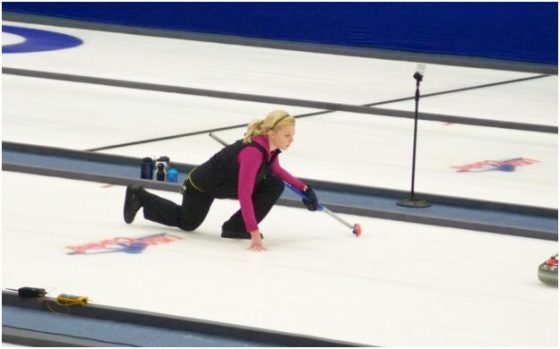
If you’re a sports fan (like me) who likes to watch the very best athletes engaged in the highest level of competition, then Daniela Brighenti’s recent article in the Yale Daily News won’t make a lot of sense to you.
Desiring to watch the best sporting events, you see, is merely a “societal (and cultural) bias” against women.
The melancholy we’re supposed to feel about this begins right away in the piece:
On Feb. 20, the Yale men’s hockey team celebrated its senior night at a sold-out Ingalls Rink. The Bulldogs defeated Clarkson University, 3–1, in the presence of 3,500 fans from the Yale and greater New Haven communities.
Just a week earlier, the Yale women’s hockey team’s class of 2016 had its own senior night, playing in its last home regular season contest against conference opponent Cornell University. There was one key difference: This time, 444 fans showed up to the game.
The disparities extend beyond Ingalls Rink. Yale men’s teams in general bring overwhelmingly more fans to the stands than women’s teams. And on the sidelines, head coaches of men’s teams last year made nearly $40,000 more, on average, than those of women’s teams — the second-highest wage gap in Ivy League athletic departments.
Wow, how dare hockey fans prefer a faster, stronger, and better skilled version of the game!
The lone commenter on the column has a terrific response: “There are two clear choices: limit the number of spectators at men’s games, or force students under penalty of expulsion to attend women’s games.”
But, unfortunately this is sort of where we’re at today. Since gender more and more is considered a “social construct,” any perceived prejudice against one of them (and remember, it’s not just two anymore) is a grievous breach of contemporary mores.
Matthew Sant-Miller, the president of Yale’s Whaling Crew, “a student group on campus supporting Yale athletics,” says “In my personal opinion, the biggest challenge is the wide-scale societal bias towards male sports over female sports.”
“However, by continuing to enthusiastically support women’s sports, I hope that the Whaling Crew will help increase attendance and slowly start to erode this bias at Yale.”
Good luck, Matt. Calling the desire to watch men’s sports over women’s a “bias” isn’t likely to shame many people into checking out the Yale softball team over the baseball team, or the women’s basketball team over the men’s.
In a larger sense, it also isn’t likely to persuade folks to change the channel from an NBA game to a WNBA game, or from a MLB contest to a softball event.

We interrupt this Sunday’s NFC Championship game to
bring you women’s curling. Enjoy!
You see, although people may be persuaded that gender is a sociological term rather than a biological one, and despite complaints from a director of a Center for Gender & Sexuality Studies about people’s “stereotypes” regarding “women’s inferior athleticism,” the fact remains that women are inferior in the sporting realm.
RELATED: How Title IX Destroyed One Small College’s Athletics Programs
And these very real biological differences between the sexes play a very large role in spectator/viewing preferences.
As I wrote almost two years ago,
Men golfers hit the ball farther, in some cases a lot farther. Men tennis players hit the ball harder and faster. Baseball players throw faster and hit the ball farther than (women) softball players. Etcetera, etcetera. Why do we have separate sports leagues for the sexes, after all?
While Title IX has increased the visibility (and popularity) of women’s college sports over the last few decades (it’s also had some rather deleterious effects on men’s sports, for what it’s worth), it simply won’t alter this basic overall premise.
This whole concept of gender difference is taken somewhat, well, skeptically in the YDN article (my emphasis):
Multiple athletes said the reason for this may be simply biological. According to several students, the attention given to men’s sports is deep-rooted in society because male athletes tend to hold inherent physical advantages over females.
Even some female athletes interviewed said men’s sports can be more exciting to watch because of the athletes’ physical abilities.
“Even as a woman, I would have to say that for the most part men’s squash is more exciting to watch. It can be frustrating, because as a woman I feel like I devote so much time and energy to my sport, but my physical capabilities are just biologically different than a man’s.”
An anonymous female athlete said the faster-paced play of men’s sports is due to men often being “fitter, stronger, faster” than their female counterparts.
Because of the faster pace, the athlete said, she generally prefers watching men’s sporting events. Spano agreed, noting that the different physical traits can make men’s sports more appealing than women’s sports.
Yale women’s fencing team member Joanna Lew takes the clueless factor up a few notches, and offers up a pipe dream:
“It is, I hope, obvious that it’s not a superior experience to watch men’s over women’s, and I hope that over time the fan bases will equilibrate,” [she] said. “It will take people noticing the inequality and acting on it, though. It’s culturally passed on that we watch men’s basketball, football, et cetera.”
*Sigh*
You may have chuckled at the article commenter’s remark from above, but given the direction in which things are moving at college campuses these days, would it really surprise you if at least one institution attempted something like that?
Or perhaps aspired to use Title IX in still more convoluted ways — like using the FCC to demand that ESPN’s “College Football Saturday” be preempted every other weekend by “College Women’s Archery Saturday”?
Read the full Yale Daily News story.
RELATED: Exposing the Lies Behind Feminists’ Attack on Men’s Sports
RELATED: Color the Opposing Team’s Locker Pink and … Risk a Lawsuit?
Like The College Fix on Facebook / Follow us on Twitter
IMAGES: Shutterstock, Brian Rawson-Ketchum/Flickr







Please join the conversation about our stories on Facebook, Twitter, Instagram, Reddit, MeWe, Rumble, Gab, Minds and Gettr.